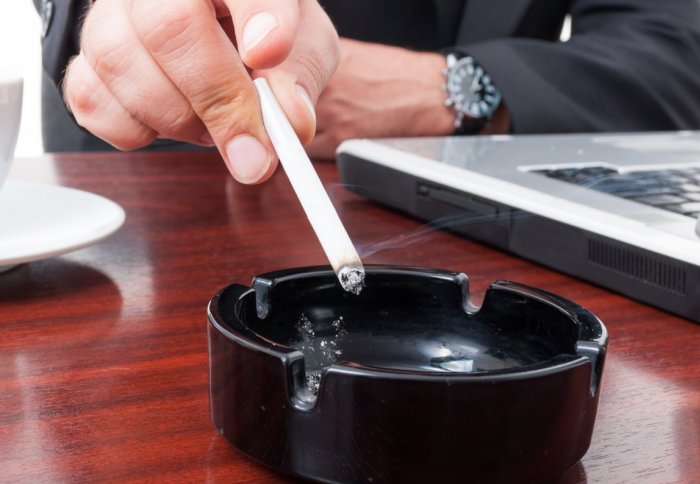One in four EU workers exposed to second-hand smoke at work

More than one in four people who work indoors are being exposed to second-hand smoke at work, according to new research.
The abstract, which was presented at the 2017 European Respiratory Society (ERS) International Congress in Milan, looked at all 28 countries currently in the European Union (EU), the majority of which have introduced smoke-free legislation to protect workers from second-hand smoke.
Although the study found a reduction in the number of people exposed to second-hand smoke in restaurants and bars, it also revealed that the number of people exposed in indoor workplaces such as offices, shops, and factories, has increased from 2009.
Dr Filippos Filippidis, lead author from Imperial’s School of Public Health, said: “This research is an essential way for us to monitor the progress that EU countries are making in upholding smoke-free laws.
He added: “Our results suggest that progress is being made to protect people visiting bars and restaurants, but it is worrying to see that the number of workers in offices, shops and factories who are being exposed to second-hand smoke is actually increasing.
“Some countries, such as Sweden, the UK and Ireland, are doing well and setting an example for what can be achieved. Others, such as Greece and Cyprus, are falling behind.”
Our results suggest there is still a lot more work to be done to protect people in some parts of Europe
– Dr Filippos Filippidis
School of Public Health
The research compared two surveys five years apart, spanning more than 55,000 people across the EU. Around half were surveyed in 2009 and the other half in 2014.
During the time between surveys several countries, including Bulgaria, Spain, Belgium and Hungary, introduced stricter legislation to ban smoking in public buildings and indoor work places to protect workers.
These new laws, and better enforcement of existing regulations, were reflected in the results of the surveys.
In 2014, one in four said they had been exposed to second-hand smoke when they visited a bar in the last year, compared to almost one in two in 2009 (25.1 per cent compared to 45.1 per cent).
For restaurants, it was one in nine in 2014, compared to around one in three in 2009 (11.8 per cent compared to 30.2 per cent).
However, of those people who work indoors, 27.5 per cent said they had been exposed to second-hand smoke at work in 2014. This has risen from 23.8 per cent in 2009.
The authors say it can be harder to enforce smoke-free legislation in workplaces because it relies on individuals making complaints. Although there are laws in place, they are not implemented to the same extent in all countries. For example, rules might not be enforced in some countries, with complaints not being dealt with appropriately.
Even after a complaint is made, there could be a lack of mechanisms, such as fines, to enforce the rules.
Risky business
The effects of exposure to second-hand smoke are well established by medical research. It is known to increase the risks of stroke, coronary heart disease and lung cancer, and is responsible for more than 600,000 deaths per year around the world.
As long as EU governments are determined to protect their citizens, exposure to second-hand smoke can be dramatically decreased, with huge health benefits.
– Dr Filippos Filippidis
School of Public Health
Dr Filippidis continues: “Our results suggest there is still a lot more work to be done to protect people in some parts of Europe.
“The first step is for all countries to pass comprehensive smoke-free legislation, as there are still places where laws are weak. Some countries clearly have very effective mechanisms for enforcing existing legislation, and the rest just need to follow their lead.”
“I can directly compare my home country, Greece, with the UK, where I have been working for the past few years. They both have very good smoke-free laws, but efforts to enforce them in Greece have been very poor, which is reflected in the high proportion of Greek people reporting exposure to second-hand smoke.
“As long as EU governments are determined to protect their citizens, exposure to second-hand smoke can be dramatically decreased, with huge health benefits.”
Dr Filippidis and his colleagues continue to monitor changes in second-hand smoke exposure in Europe. Next, they will try to uncover exactly why some countries have improved less than others.
The results come as the ERS and European Lung Foundation launch their annual Healthy Lungs for Life campaign with a series of events for the public and health professionals focusing on air pollution, occupational exposure, and smoking cessation.
ERS Abstract no: PA1252, “Trends in exposure to second-hand smoke in the European Union, 2009-2014” by Constantine Vardavas, Filippos Filippidis, Anthony Laverty, Ute Mons, Carlos Jimenez-Ruiz; Passive smoking and epidemiology session, 12:50 hrs CEST, Sunday 10 September.
Article text (excluding photos or graphics) © Imperial College London.
Photos and graphics subject to third party copyright used with permission or © Imperial College London.
Reporter
Caroline Brogan
Communications Division